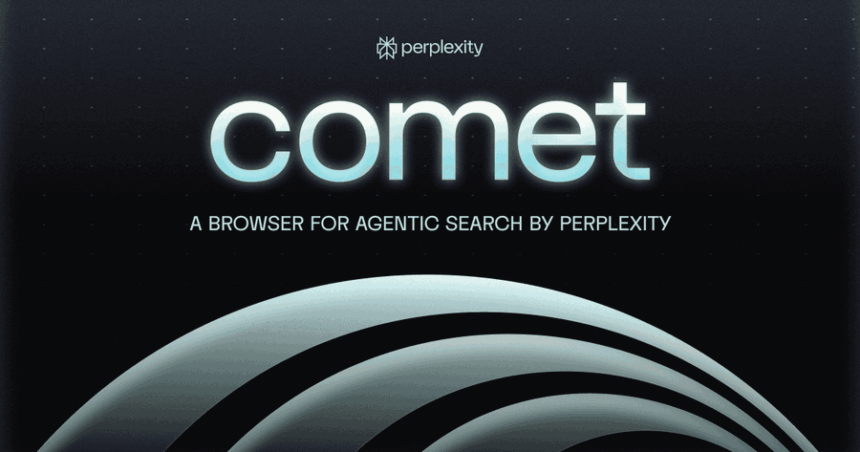Imagine a web browser that doesn’t just show you information—but thinks alongside you. That’s Comet, the groundbreaking AI-powered web browser from Perplexity, launched today. It’s not another Chrome clone. It’s a reimagining of how we interact with the internet—where curiosity is met with context, tasks automate themselves, and your browser becomes a collaborator. If you’re tired of tab overload, fragmented workflows, and chatbots that feel bolted on, Comet promises to be the thought partner you’ve been waiting for.
Comet is here.
— Perplexity (@perplexity_ai) July 9, 2025
A web browser built for today’s internet.pic.twitter.com/cFPeghl2YM
Why Comet? Perplexity’s Bold Bet Beyond Search
Perplexity, already a darling of the AI search revolution, isn’t stopping at answering questions. With Comet, they’re attacking a bigger problem: the browser itself. Google Chrome dominates with ~68% market share, yet it’s fundamentally unchanged for decades—a passive window onto a chaotic web. Perplexity CEO Aravind Srinivas calls this a “one-way lens” stifling curiosity.
Comet flips the script:
- AI as the Core, Not an Add-On: Unlike Chrome’s bolt-on Gemini or Edge’s Copilot, Comet bakes Perplexity’s agentic AI into every click, tab, and task.
- Beyond “Browsing” to “Doing”: Comet isn’t about finding links—it’s about completing work. Research, compare, summarize, book, buy—all via conversation.
- Privacy by Default: Data stays local—no cloud training on your history. A direct appeal to the privacy-conscious.
Inside Comet: How This AI Web Browser Actually Works
Meet Your Sidecar Co-Pilot: The Comet Assistant
Open any webpage, and Comet Assistant lives in a sidebar, seeing what you see. No copying links, no tab-hopping. Ask naturally:
- “Summarize this research paper in bullet points.”
- “Find cheaper alternatives to this product.”
- “Book a 2 pm meeting with Alex next Thursday.”
During testing, TechCrunch found it brilliantly intuitive for quick tasks—like explaining complex social posts or translating text—but stumbled on multi-step actions (like booking airport parking) due to AI “hallucinations”.
Agentic Search: Your Browser Thinks Ahead
“Agentic Search” is Comet’s superpower. Instead of reactive queries, Comet’s AI:
- Anticipates Needs: Resurfaces past tabs via natural language (“Reopen that recipe I viewed yesterday”).
- Connects Dots: Links your current reading to prior research, creating a “digital memory”.
- Acts Autonomously: Compiles data from multiple sites into reports, tables, or emails—no manual copying.
Deep Perplexity Integration: Search That Understands Context
Forget switching to a separate AI search tab. Comet has Perplexity’s real-time, citation-rich answers built-in. Highlight text, right-click, or summon with Cmd/Ctrl + L to:
- Get summaries with sources
- Translate jargon-heavy content
- Fact-check claims instantly
The Privacy Trade-Off: Power vs. Permission
To enable features like calendar management or email summaries, Comet requests extensive permissions (e.g., full Google Account access). While data isn’t used for training, this may unsettle some users. Perplexity counters with native ad-blocking and opt-out data sharing.
Who’s Comet For? Target Users and Pricing Realities
The Power User’s Playground (With a Premium Price)
Comet isn’t free—or cheap. It’s exclusively for Perplexity Max subscribers at $200/month. This tier targets:
- Researchers & Academics: Automating literature reviews and data synthesis.
- Content Creators: Streamlining deep-dive research across 100s of tabs.
- Business Strategists: Tracking competitors and generating reports on-demand.
Max subscribers also get unlimited “Labs” usage (for building custom AI tools), priority access to top models (Claude Opus 4, GPT-o3-pro), and early feature drops.
Is It Worth the Cost? A Reality Check
At 10x the price of Perplexity Pro ($20/month), Max—and by extension Comet—is a hard sell for casual users. But for professionals drowning in information overhead, the time savings could justify the cost. Think:
- Saving 5+ hours/week on research compilation
- Automating meeting prep from email threads
- One-click competitive analysis dashboards
Comet vs. The World: Can Perplexity Disrupt Chrome?
Google Chrome’s dominance seems unshakeable, but Comet enters a suddenly crowded AI browser wars:
- The Browser Company’s Arc (Dia): Focuses on spatial UI and tab management.
- Microsoft Edge (Copilot): Strong enterprise integration but less autonomous.
- OpenAI’s Rumored Browser: Hires from Chrome’s team but still unlaunched.
Comet’s differentiator? Unified agentic workflow. While rivals tack AI onto legacy browsers, Comet rebuilds the experience around AI from the ground up. Perplexity’s 780 million monthly queries also give it a user base to convert.
The Road Ahead: Challenges and Possibilities
Short-Term Hurdles
- Hallucination Issues: As TechCrunch’s parking test showed, unreliable task execution plagues complex agents.
- Publisher Tensions: Perplexity faces lawsuits (News Corp, Forbes) over content use. Its publisher partnership program needs traction.
- Adoption Curve: Convincing users to switch browsers is harder than switching search engines.
The Future of Browsing? Agentic Ecosystems
If Comet succeeds, we could see:
- Third-Party AI Agents: Plugging into Comet like Chrome extensions.
- Enterprise Editions: For secure team research (hinted for late 2025).
- E-Commerce Integration: Expanding Perplexity’s “Buy With Pro” shopping agent natively.
Final Thoughts: Should You Try Comet?
Comet isn’t just a new browser—it’s a paradigm shift. By making AI the interface, Perplexity bets that proactive assistance beats passive browsing. For now, its high cost and early flaws make it a power-user luxury. But as AI reliability improves, Comet could democratize a future where your browser doesn’t just respond to clicks—it anticipates your needs.
Want early access? Join the Comet waitlist or subscribe to Perplexity Max. For a hands-on preview, read TechCrunch’s Comet review.
What’s your take? Will agentic browsers replace our current tools? Share your thoughts below!
